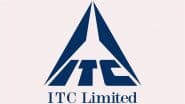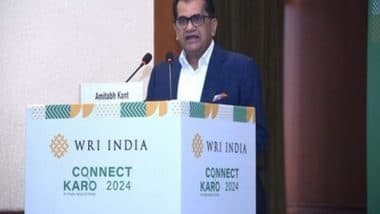PRNewswire
New Delhi [India], September 12: "Our shared ambition for a greener, more resilient energy future must transform into concrete actions at every level--global, national, and especially at the state level. The proactive measures taken by Indian states are not only shaping India's energy landscape but also impacting the global narrative on clean energy," said Amitabh Kant, G20 Sherpa of India in his keynote address at the mid-day plenary session on 'Role of States in India's Energy Transition' at WRI India's annual flagship event, Connect Karo 2024.
Also Read | Virat Kohli and Babar Azam To Play Together! Speculations High as Afro-Asia Cup Return Rumours Emerge.
Talking about the crucial role played by states in achieving India's national and international goals, Kant further said, "Beyond power generation, states are emerging as pivotal hubs for clean energy manufacturing and transport sectors, driving growth, creating jobs, and positioning India as a preferred investment destination."
The session brought together government officials and key stakeholders to discuss the opportunities and challenges with respect to multiple elements of state's energy transition including generation, transition, markets, emerging and innovative technologies and planning processes.
Also Read | SpaceX Polaris Dawn Astronauts Create History by Conducting First-Ever 'All Civilian' Spacewalk.
Connect Karo 2024 is WRI India's flagship event that focuses on exploring innovative solutions for critical environmental and sustainability challenges, bringing together experts, policymakers, government officials and researchers from India and overseas to deliberate on the climate action, sustainable food and restoration, energy and developmental challenges facing India.
During the plenary session on 'Enabling Sustainable and Resilient Food and Land Systems in India', Yogita Rana, IAS, Joint Secretary of Integrated Nutrient Management said, "We must tackle the urgent issue of unsustainability by shifting mindsets towards prioritizing safe and nutritious food and choices." She highlighted the government's initiatives, such as the Soil Health Card, which helps farmers reduce reliance on chemical fertilizers.
Pritee Chaudhary, IRS, Regional Director of the Food Safety and Standards Authority of India, joined virtually and emphasized the importance of reducing food wastage. She mentioned efforts to promote safe food practices and repurpose resources, like surplus food distribution and recycling cooking oil, urging these measures be scaled up across regions. "Every grain wasted could feed someone in need; this is the behavior change we need," she said.
Madhav Pai, CEO, WRI India, further emphasized, "India urgently requires a transformation in its food and land use systems to safeguard its people, strengthen the local economies, tackle environmental challenges and ensure healthier natural ecosystems. This can help us build a future where India's landscapes are restored, agricultural yields are enhanced, soil and water are rejuvenated creating inclusive livelihood opportunities."
Key Initiatives/ Research Papers Launched and Sessions from Day 2 of Connect Karo:
* Launch I India Alliance for Clean Construction (IACC): IACC aims to steer and champion frameworks that can enable a smoother transition towards adoption of clean air practices in the construction sector. The platform will bring together builders, engineers, practitioners, building material and technology vendors, academia and other industry stakeholders working towards the common agenda of mitigating dust and emissions at construction sites.
* Working Paper | Applying a Data-Driven Approach to Assess Greenhouse Gas Mitigation Potential in Urban India: Learnings from Surat, Ujjain, and Indore: This paper highlights key strategies for reducing greenhouse gas (GHG) emissions in urban areas. It recommends strengthening institutional frameworks and data collection mechanisms to help Indian cities effectively meet their climate targets.
* Working Paper | Tomato trail: Tracking food loss and food waste in Madhya Pradesh: This study has assessed food loss and food waste across the tomato supply chain, identifying the critical loss points, key causes and drivers, role of gender and social inclusion, and potential solutions in reducing the losses and wastage.
* Working Paper | Assessing Financing Challenges for Implementing the Large-scale Electric Bus Program in India: This working paper looks at understanding early-stage challenges in India's e-bus financing from financier and operator perspectives, drawing from multiple stakeholder and expert interviews.
* An interactive session titled 'Solution Room: Enhancing Women's Workforce Participation in Greener MSME Jobs' that delved into multiple stakeholders' perspectives on addressing the current challenges faced by women enterprises and facilitating the opportunities presented by the potential of green jobs in India's MSME sector to boost women's workforce participation.
* A session on 'Initiative for Transport Data and Dialogue' - a platform to foster innovative data-driven solutions to solve pervasive urban mobility challenges. Through this initiative, WRI India aims to explore multi-stakeholder approaches to enhance and improve the usage of public transport in cities and enable the switch from Personal2Public (P2P). The session showcased a tool that uses open data to capture urban mobility patterns in several Indian cities and helps users analyze future scenarios with higher share of public transport and its potential benefits. A panel discussion also explored how Digital Public Infrastructure (DPI) principles can revolutionize urban mobility by improving the service delivery of public buses and overall commuter experience.
Media Contacts:
Tanushree Venkatraman | +91-9819761990 | tanushree.venkatraman@wri.org
Satbhan Singh | +91-8920105135 | satbhan.singh@wri.org
About WRI India
India Resources Trust, an independent charity referred to as 'WRI India', provides objective information and practical proposals to foster environmentally sound and socially equitable development. Our work focuses on building sustainable and livable cities and working towards a low carbon economy. Through research, analysis, and recommendations, WRI India puts ideas into action to build transformative solutions to protect the earth, promote livelihoods, and enhance human well-being. We are inspired by the World Resources Institute (WRI), a global research organization. Know more: https://wri-india.org/
The press release is intended solely to spread awareness, provide information, and foster an informed discussion on the subject matter. The information has been collated by WRI India from various sources. The views and opinions expressed in this release do not reflect those of WRI India.
Photo: https://mma.prnewswire.com/media/2504045/Amitabh_Kant_G20_Sherpa_India_WRI_India.jpg
Logo: https://mma.prnewswire.com/media/2502649/WRI_CK_Logo.jpg
(ADVERTORIAL DISCLAIMER: The above press release has been provided by PRNewswire. ANI will not be responsible in any way for the content of the same)
(This is an unedited and auto-generated story from Syndicated News feed, LatestLY Staff may not have modified or edited the content body)













 Quickly
Quickly

















